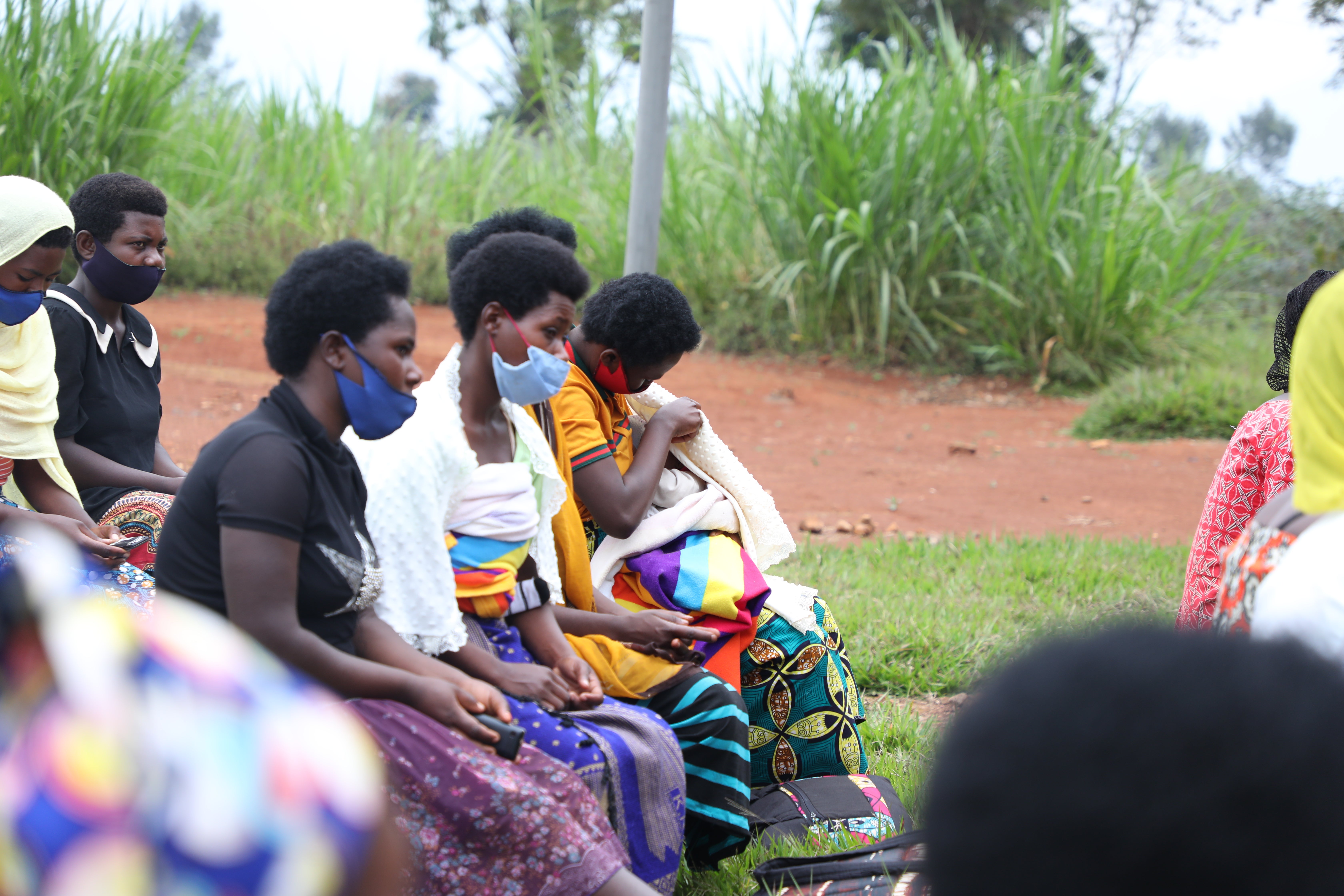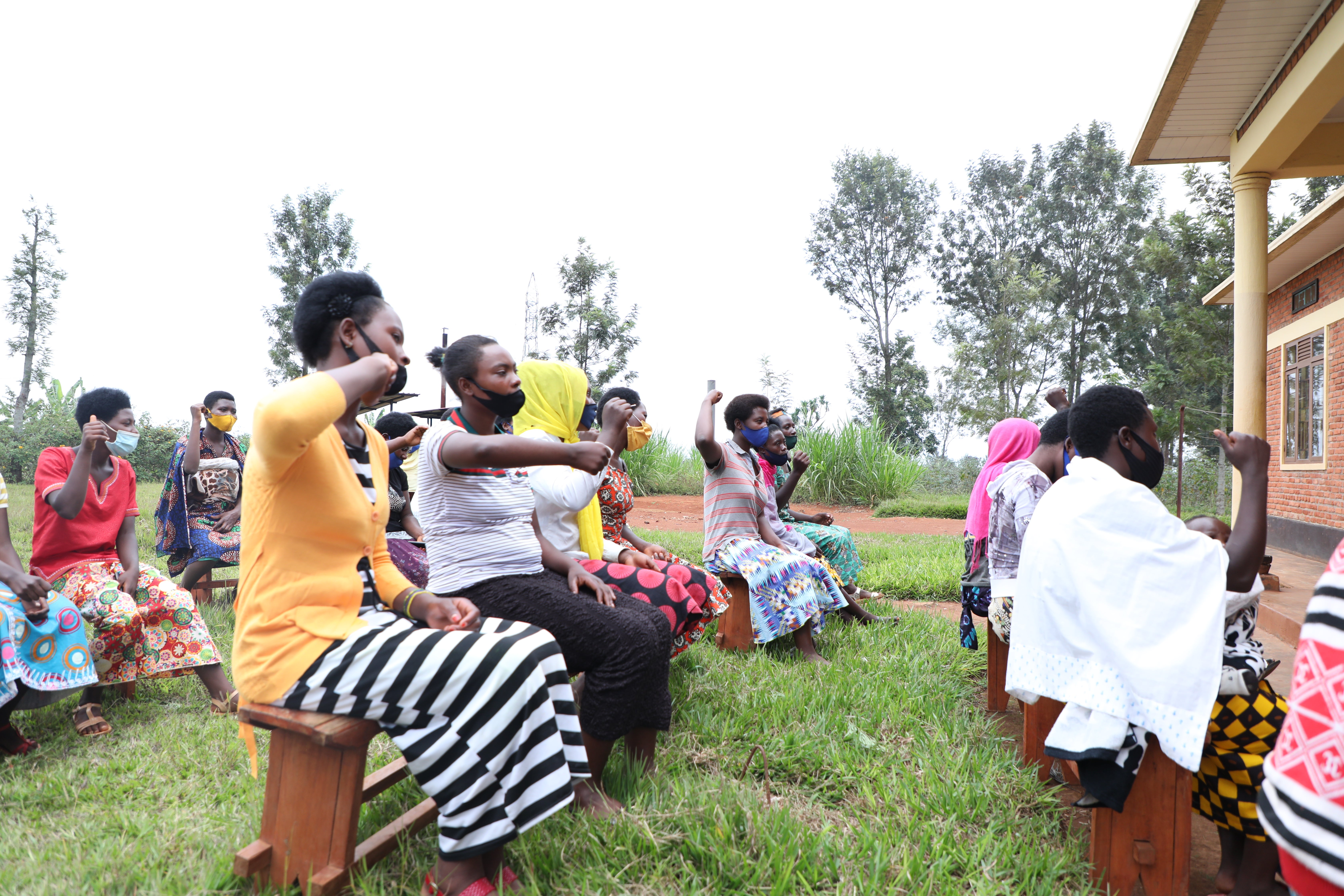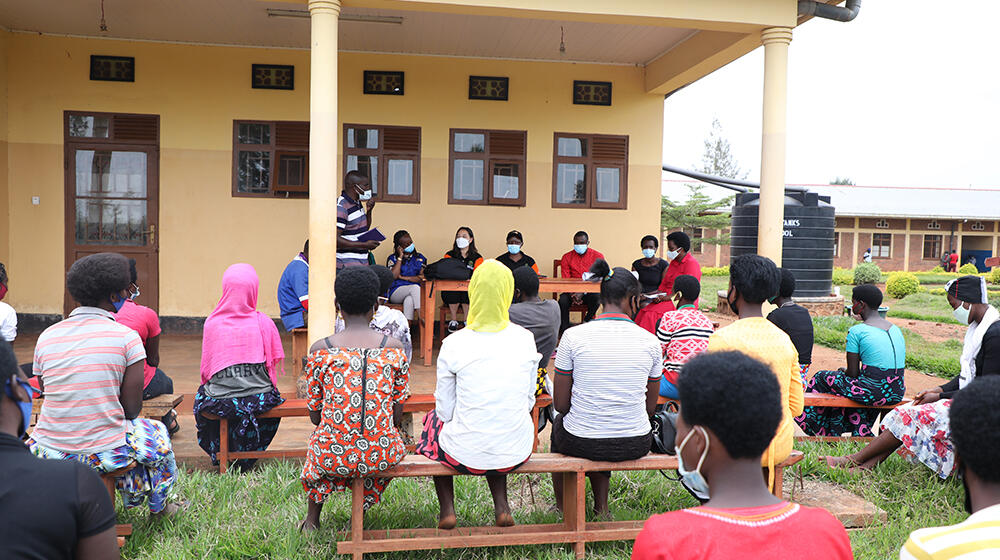Early and unintended pregnancy is both a cause and a result of long term negative impact on girls’ education. A UNFPA statistical review of the evidence for sub-Saharan Africa, shows that the poorer an adolescent girl (aged between 15 and 19 years of age) is and the less access she has to education, the more likely she is to become pregnant. An adolescent girl without formal education is more than four times as likely to become pregnant than an adolescent girl with secondary education. (UNFPA, 2010). Other studies show that improvements in educational attainment are the key to national productivity and income growth (Cuaresma et.al, 2013). Moreover, educating girls results in better health, fulfillment, and employment for them, and improved health for their families and children (FAWE, 2017).

First Time Young Mothers in Rusizi District met several time to discuss on their empowerment need and on SRHR and GBV prevention. Photo field visit June/2021
Iradukunda Diane-19, is a young mother from Rusizi District in Western Province of Rwanda. Persuaded to study at the highest level since her childhood; but a few months after writing her registration for P6 National Exams, she dropped out of school.
“My parents were always in conflict, my dad had decided that I was only going to school after farming every morning, yet I was preparing for the P6 national exams.” Tearful Iradukunda narrates.
“One day during the holiday, my Dad beat me to death and I decided to flee far from home and school and that is how I missed the exams.” She added.
Just after a short time, Iradukunda came looking for a job as a domestic worker in Kamembe, where she met a man who got her pregnant after only 3 months in job.
Most of the First Time Young Mothers (FTYM) stories are a double tragedy of a helpless teenager and enraged parents. The parents think their children have lost a future, they feel ashamed because of what the community thinks of teenage pregnancy, and are not adequately prepared to handle the stigma associated with it. On the other hand, because of the stigma and lack of help from their families, most young mothers are abandoned or kicked out from home. Pregnant adolescents and young mothers suffer from stigmatization, rejection by and violence from family members and the community, which leads to double victimization and exacerbates their vulnerability.
“After realizing that I was pregnant my life got worse. My Father harassed me and my mother had nothing to say because she was considered guilty as well.” Iradukunda narrates adding that until now she could not manage to overcome the unpredicted censorship of her father, who could not bear to rob her the little money she had earned for her child’s need. But like her colleagues, Iradukunda is motivated to strive for the future.
New hope for the better future of their children.
To support these young mothers, Imbuto Foundation through FASSACO (Foundation des Activistes pour la Santé de qualité dans la Communauté) in collaboration with UNFPA and funding support from the Korea International Cooperation Agency (KOICA), the aid agency of the Government of the Republic of Korea is implementing the Healthy & Empowered Youth Project in the districts of Rusizi, Nyamasheke and Karongi . The Project supports the most vulnerable young people, mainly FTYM, to undertake economic empowerment training, get life skills mentorship, and provide inputs to start income-generating activities (IGA).
“At the beginning the situation was really hard. Many of the young mothers felt like they would commit suicide. But now their lives are getting better thanks to the support they receive from different partners.“ Said Emmanuel UWIZEYE, the leader and mentor of FASSACO
“We have brought them together in groups where they can raise money and be able to run a project that will empower and help them thrive. We are helping others develop the skills they need for their future development and the well-being of their children.” He added

Through their economic empowerment journey, the first time young mothers profit to discuss about SRHR for their future and how to overcome the Gender Based Violence in neighborhood. Photo field visit June/2021
From August 2020, FASSACO worked with the community leaders to select the most vulnerable youth for inclusion in the economic empowerment support interventions. In only the first year of implementation, the Healthy & Empowered Youth Project counts numerous achievements. This is due to behavior change among teenage mothers, the support of local leaders, parents, and guardians in creating a supportive environment for young mothers to enjoy their Sexual and Reproductive Health and Rights.
“When I joined the group, I was really confused. But today my goal is to move forward and be successful. I now have goats and chickens that I bought after joining this group. Honestly if I hadn’t been in the group I wouldn’t have achieved it” Uwimana Rebecca, 21, young mother and member of the empowerment group in Nzahaha Sector.
“Before joining the group, everyone was calling me names. But after FASSACO approached us and started training us on how to improve and empower ourselves, parents also began to see the change that we were making. They started supporting me, and now I am back being a child at home. We appreciate the support we get through this project.” Tuyishime Donatha, 20, young mother in Rusizi District.
“Before, it was hard to discuss with my parents, they did not want to have a conversation with me. But after FASSACO and Imbuto reached out to us and our parents, and after attending the PAC (parent-adolescent communication), things are going well between us.” Said Uwimana Christine, 20.
“In our group, we talk about what is going on in our home, and we discuss how to deal with specific situations. This helps us to know how to behave in front of our parents. We also discuss development activities that we should undertake and how to work hard to empower ourselves”. She added
Launched in July 2020 by KOICA, UNFPA, and the Ministry of Youth and Culture, the “Health & Empowered Youth” project will be implemented over three years 2020 – 2023 in the districts of Rusizi, Karongi, Nyamasheke; and across six refugee camps and host communities of Mahama, Kigeme, Mugombwa, Kiziba, Gihembe, Nyabiheke.


